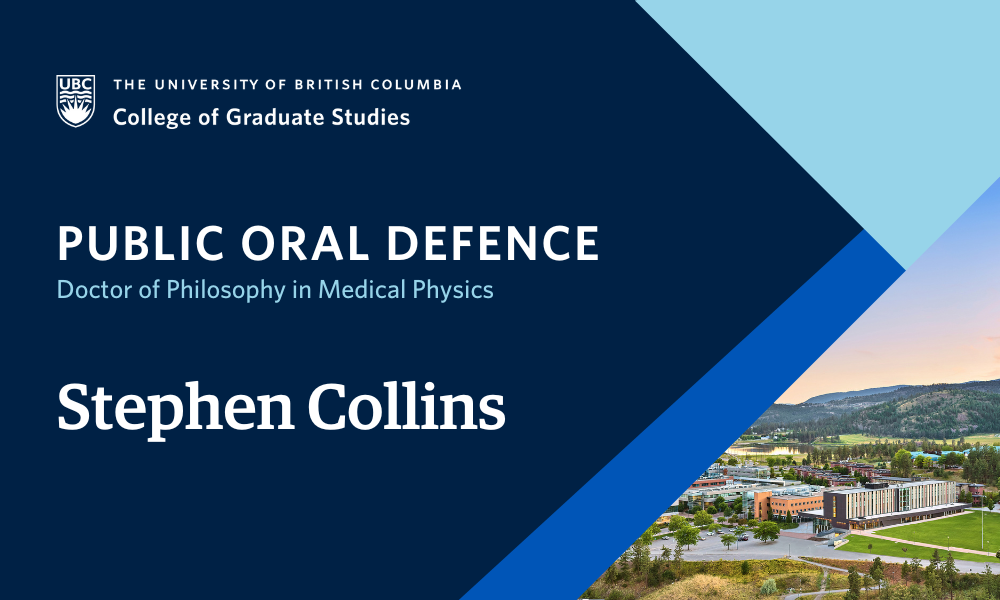
- This event has passed.
Dissertation Defence: Iterative Image Reconstruction for Optical CT Radiochromic Gel Dosimetry
July 18, 2024 at 9:00 am - 1:00 pm

Stephen Collins, supervised by Dr. Andrew Jirasek, will defend their dissertation titled “Iterative Image Reconstruction for Optical CT Radiochromic Gel Dosimetry” in partial fulfillment of the requirements for the degree of Doctor of Philosophy in Medical Physics.
An abstract for Stephen Collins’ dissertation is included below.
Examinations are open to all members of the campus community as well as the general public. Registration is not required for in-person defences.
ABSTRACT
Gel dosimeters are a potential tool for measuring the complex dose distributions in modern radiotherapy, which aims to enhance radiation dose precision to tumours and utilizes hypofractionated treatment regimens. Verifying these dose distributions remains an active research area due to the complexity of delivery systems and the lack of suitable three-dimensional dosimetry tools. Recently, a prototype tabletop solid-tank fan-beam optical CT scanner for readout of gel dosimeters was developed. However due to refraction, this scanner does not have a straight raypath from source to detector, necessitating the use of iterative image reconstruction techniques instead of filtered backprojection (FBP). Iterative reconstruction requires a system matrix to describe the imaging system’s geometry, but stored system matrices can become immensely large, making them impractical for storage on a typical desktop computer.
This work aims to: (1) reduce the system matrix storage requirements through use of polar coordinate discretization and determine the effects of polar coordinate discretization on image quality, (2) determine optimal iterative reconstruction algorithms in terms of image quality and robustness, and (3) determine the feasibility of the application of a polar coordinate discretized system matrix to the optimal iterative reconstruction algorithms.
Cartesian coordinate discretized system matrices (CCDSMs) and polar coordinate discretized system matrices (PCDSMs) were generated by discretizing the reconstruction area of the optical CT scanner into a Cartesian pixel grid and a polar coordinate pixel grid, respectively. Discretizing the image pixel elements in polar coordinates achieved a system matrix storage size reduction of 99.26% with only minimal reduction in the image quality.
A novel image quality based stopping condition was developed and utilized to determine optimal iterative reconstruction algorithms. The optimal algorithms found through a quantitative image quality scoring metric were FISTA-TV and S-CG-2-NA. Both algorithms were stable from over iterating and had excellent edge detection with ESF MTF 50% values of 1.266 mm−1 and 0.992 mm−1 , respectively.
The application of a PCDSM to the FISTA-TV and S-CG-2-NA algorithms was shown to be feasible. Quantitative image quality analysis shows that both algorithms, while utilizing a PCDSM, offer acceptable noise reduction and spatial resolution for gel dosimetry. This research shows that iterative reconstruction techniques can be accurate and practical, making optical CT radiochromic gel dosimetry more viable for routine clinical use.